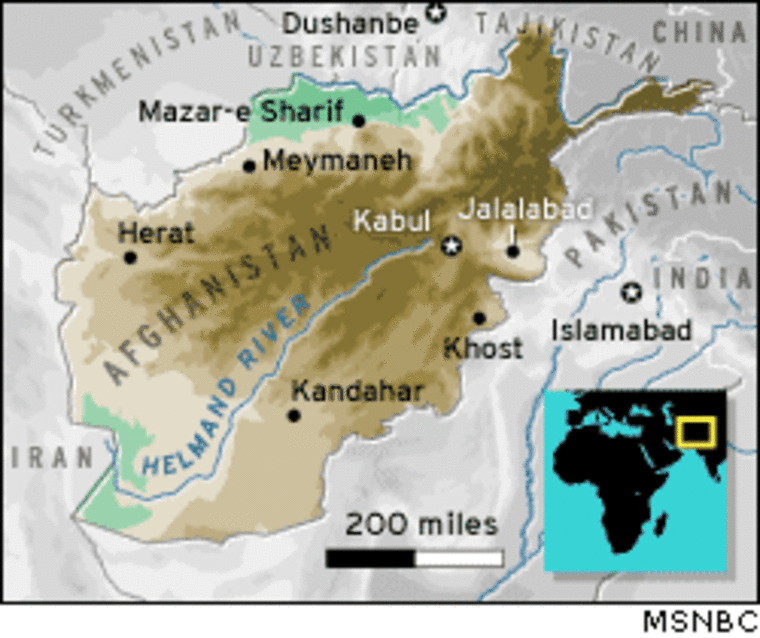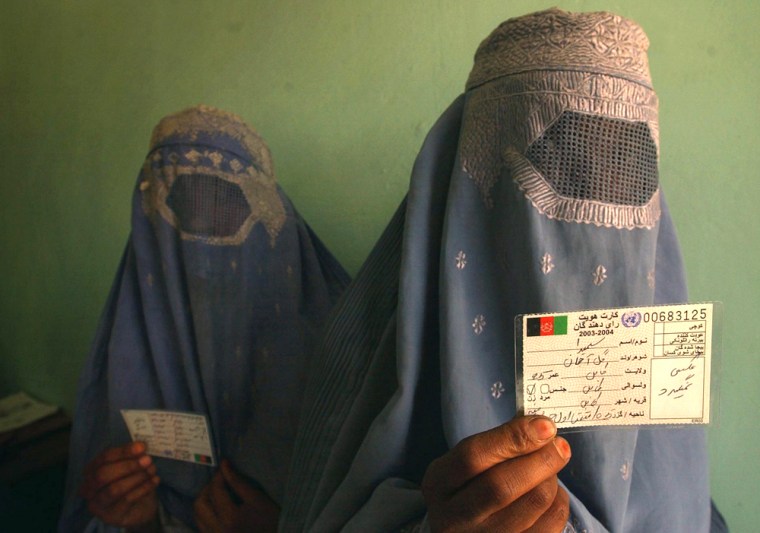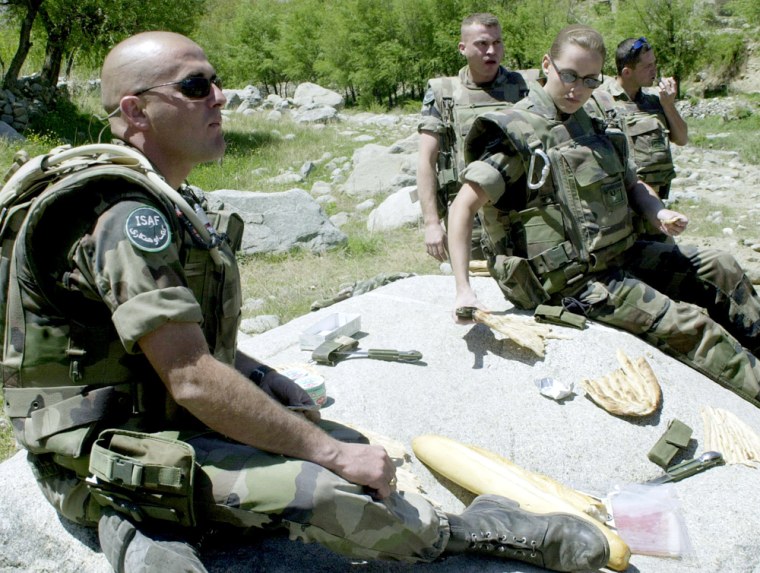Largely lost amid the sound and the fury of Iraq — both the actual war there and the domestic battle over how best to achieve something approaching victory — are the warning flares shooting skyward above the first target of American regime change in this century: Afghanistan.
In the past week, several authoritative voices warned that the security situation in the one-time Islamic state and al-Qaida base is deteriorating. Most seriously, there are real signs that NATO, which President George W. Bush apparently hopes will take the handoff from America in Iraq sometime soon, is stumbling even to support a relatively small operation of 6,000 troops in Afghanistan.
“The Europeans in NATO, with the exception of the British, simply are not up to such missions anymore,” says Dan Goure, a military analyst with close ties to the Bush administration now with Washington-based Lexington Institute. “They have a total of 2.6 million people under arms, and yet they would be incapable of deploying a force large enough to handle Libya, let alone Iraq.”
Promise vs. performance
Having taken over command of the Afghan stabilization force, ISAF, last year from another “coalition of the willing,” NATO set out to extend the relative calm that prevailed in the Afghan capital, Kabul, to the rest of the country. To date, it has done no such thing. Goure’s stark analysis is disputed by European military officers, who cite frequent expeditionary missions to West Africa and their involvement in the Balkans, too, but on the specific topic of Afghanistan, there are ample signs from Europe itself that the mission is not going well.
- A leading military think-tank with strong ties to NATO, the
- NATO’s Secretary General, Jaap de Hoop Scheffer, has expressed frustration about the alliance’s inability to supply a small number of helicopters and medical units to Afghanistan in spite of the fact that the request was made months ago. He told member states’ ambassadors that the mission was in danger of failure because of member nations’ failure to deliver resources and vowed to tackle the gap between alliance promises and performance at the upcoming
- A group of British parliamentarians returned from an Afghan inspection visit expressing deep concern about the stability of the country, prompting Prime Minister Tony Blair to announce that he, too, would insist that the flagging mission would be a major item on NATO summit agenda.
Ominous for Iraq
The implications of NATO’s failure to date in Afghanistan flow far beyond that nation’s borders. Implicit in President George W. Bush’s speech on Monday, in which he laid out his five-point plan for winning the peace in Iraq, is the notion that NATO would ultimately play a decisive role in Iraq.
“Next month, at the NATO summit in Istanbul, I will thank our 15 NATO allies who together have more than 17,000 troops on the ground in Iraq,” the president said.
”At the summit, we will discuss NATO's role in helping Iraq build and secure its democracy.”
But, of course, NATO’s largest armies steered well clear of Iraq and show no particular appetite for sampling Fallujan cuisine anytime soon. Turkey is constrained by historic grievances with the Kurds; France and Germany have ruled out sending troops, claiming that they are doing their part elsewhere, and Spain’s government bailed out for political reasons after the Madrid bombing.

Even if NATO engaged in Iraq wholeheartedly, problems remain. Politically, the arrival of the western alliance would hardly be viewed as an improvement by those who view Europe and America both as culpable for turning Saddam into the well-armed megalomaniac he became in the first place.
“If the United States thinks that turning Iraq over to NATO will be seen as internationalizing it, it should think again,” says a senior U.N. official, insisting on anonymity. “In Iraqi eyes, NATO is a puppet organization of the United States. That does not solve anything.”
NATO also faces very real questions of logistical and military competence, analysts suggest.
Goure, a defense official during the Reagan administration, says the draftee oriented forces of the continent remain unreformed from the days when the Soviet enemy was expected to pour westward over the West German border. Draftees, he notes, are short-time soldiers and thus poorly trained. And politically, European leaders will be loath to send units of draftees to die in Iraq.
Tough enough?
NATO, in any case, seems to have its hands quite full in Afghanistan. In spite of nine months in command there, NATO forces still have failed to deploy any of their forces outside of Kabul, with the exception of a 500-strong German “provincial reconstruction team” that set up shop last winter in the relatively quiet northwestern town of Kunduz. NATO hopes to establish five more such teams by the summer, but it has put back the deadline repeatedly.
The practical effect of this conservative approach to policing the country has been to cede the vast majority of it to whoever is bold enough to seize control. The warlords once referred to as the Northern Alliance reverted to factionalism and have carved up swaths of the country along ethnic, tribal and poppy growing lines.
In the west, along the Iranian border, the warlord Ismail Khan set up shop in Herat and has allowed local leaders to continue enforcing Taliban-era edicts against women, dissent and other forms of “heresy.” General Abdul Rashid Dostum, an ethnic Uzbek warlord, controls a stretch of northern territory. While Karzai’s central government security forces vow to disarm the estimated 100,000 militiamen by June, they’re getting no help from NATO or the United States, each of whom appear to be pursuing their own agendas.
The Taliban, too, are making a comeback. Across the southern rim of the country, where the U.S. forces launch raids and sweeps for al-Qaida, Taliban figures who served as ministers or top military commanders again are giving interviews to journalists and declaring their intention to take the country back. Their support among the ethnic Pashtuns, their base, is uncertain. But anecdotal evidence suggests no one is counting them out yet.
One United Nations relief official who recently returned from Afghanistan notes that the inability of NATO or the U.S. to enforce some kind of law and order in such areas means that every potential act of kindness or progress — from voter registration drives to immunizations to food deliveries — is invariably poisoned by politics.

“Basically, you need to travel with armed guards, and these people have their own politics,” the official says. “You can’t really talk about Afghanistan as a country under these conditions. It’s several countries, or, more accurately, it’s a lot of disconnected regions.”
As a result, U.N. figures suggest only about 2 million of Afghanistan's 10 million eligible voters have been registered for its upcoming elections in September.
Big stakes in June
As in Iraq, there are successes for American policy in Afghanistan, beginning with the routing of the Taliban. The tacit negotiations held after the Taliban was driven from power with prickly stakeholders like Iran, Russia and Uzbekistan have kept outside mischief to a minimum. The wise decision to ask Afghans themselves to bless the post-war caretaker president, Hamid Karzai, and the fact that he comes from the country’s dominant ethnic group, the Pashtun, laid the groundwork for reconstruction and the expansion of central authority across the lawless nation. Foreign aid has continued to flow in, too, defying a tendency for pledges to dry up after an initial surge.
Of course, there are the roads rebuilt, schools reopened and medical clinics dispensing care to an impoverished population. Many of these efforts are chronicled on the U.S. Commerce Department’s website.
The successes, however, will not be on the agenda of NATO’s conference, already looking to be an enormous test of Bush’s ability to put past animosities behind and lure traditional American allies back to the front lines.
Richard Holbrooke, the former diplomat whose statements need to be seen in light of the fact that he seems to be running for the job of secretary of state in a future Kerry administration, nonetheless got it right last week when he said: “If he [Bush] doesn’t get something at Istanbul, I’d say he’s failed yet again. At a minimum he needs to get a NATO statement of readiness to support this whole [Iraq stabilization] process.”
The problem is, NATO may not be able to do it.
“NATO suffers from three huge liabilities: nearly total casualty aversion, a discomfort with their ‘out-of-area’ role, and a complete lack of suitable forces to send into a war zone,” says Goure.
A NATO command in Iraq would operate with the same handicaps. True, it would include a far larger contingent of its vital American and British core than ISAF has in Afghanistan. But NATO is no silver bullet, politically or militarily, in either troubled land.
